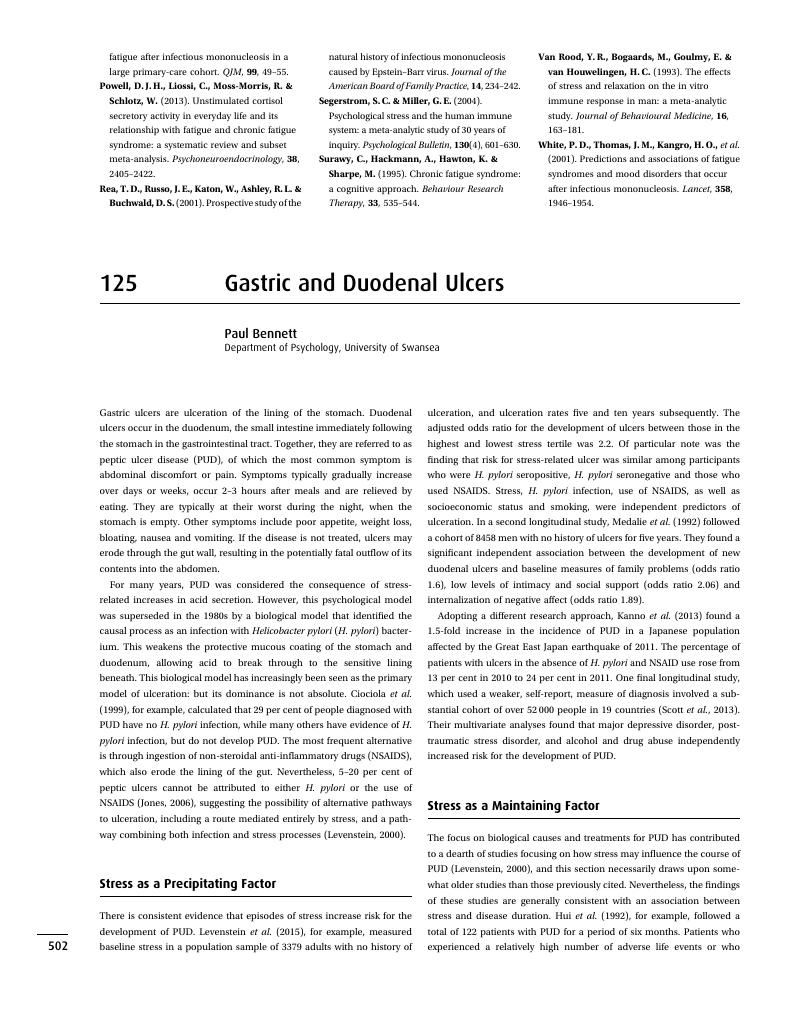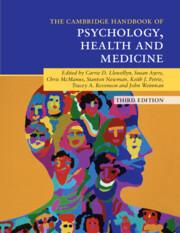Book contents
- Cambridge Handbook of Psychology, Health and Medicine
- Cambridge Handbook of Psychology, Health and Medicine
- Copyright page
- Contents
- Contributors
- Preface
- Part I Psychology Health and Illness
- Part II Medical Topics
- Section 1 Prevention and Screening
- Section 2 Medical Conditions and Symptoms
- 93 Abortion
- 94 Affective Disorders
- 95 Allergies
- 96 Amnesia
- 97 Aphasia
- 98 Asthma
- 99 Back Pain
- 100 Birth Complications
- 101 Burns
- 102 Cancer
- 103 Cancer: Breast
- 104 Cancer: Lung
- 105 Cancer: Prostate
- 106 Cancer: Skin
- 107 Cardiovascular Disease
- 108 Chronic Fatigue Syndrome
- 109 Chronic Obstructive Pulmonary Disease
- 110 Chronic Pelvic Pain
- 111 Cleft Lip and Palate
- 112 Cold, Common
- 113 Coronary Heart Disease
- 114 Cystic Fibrosis
- 115 Dementias
- 116 Diabetes Mellitus, Type 1
- 117 Diabetes Mellitus, Type 2
- 118 Disfigurement
- 119 Drug Dependence: Opiates, Stimulants and Benzodiazepines
- 120 Eating Disorders
- 121 Endocrine Disorders
- 122 Enuresis
- 123 Epilepsy
- 124 Epstein–Barr Virus
- 125 Gastric and Duodenal Ulcers
- 126 Growth Retardation
- 127 Haemophilia
- 128 Headache
- 129 Hearing Disorders
- 130 HIV/AIDS
- 131 Hyperactivity
- 132 Hypertension
- 133 Hyperthyroidism
- 134 Inflammatory Bowel Disease
- 135 Insomnia and Sleep Disorders
- 136 Irritable Bowel Syndrome
- 137 Lower Urinary Tract Symptoms
- 138 Lymphoedema
- 139 Meningitis
- 140 Menopause and Postmenopause
- 141 Motor Neuron Disease
- 142 Multiple Sclerosis
- 143 Myasthenia Gravis
- 144 Neuromuscular Disorders
- 145 Non-Cardiac Chest Pain
- 146 Obesity
- 147 Osteoarthritis
- 148 Osteoporosis
- 149 Parkinson’s Disease
- 150 Perinatal Mental Health
- 151 Pregnancy and Childbirth
- 152 Premenstrual Syndrome
- 153 Renal Failure
- 154 Rheumatoid Arthritis
- 155 Sexual Dysfunction
- 156 Sexually Transmitted Infections
- 157 Sickle Cell Disease
- 158 Skin Disorders
- 159 Spina Bifida
- 160 Spinal Cord Injury
- 161 Stroke
- 162 Suicidal Behaviour
- 163 Traumatic Brain Injury
- 164 Unintentional Injuries
- 165 Vertigo and Dizziness
- 166 Vision Disorders
- 167 Visual Disability
- 168 Voice Disorders
- 169 Volatile Substance Misuse
- Section 3 Treatment and Care
- Index
- References
125 - Gastric and Duodenal Ulcers
from Section 2 - Medical Conditions and Symptoms
Published online by Cambridge University Press: 05 June 2019
- Cambridge Handbook of Psychology, Health and Medicine
- Cambridge Handbook of Psychology, Health and Medicine
- Copyright page
- Contents
- Contributors
- Preface
- Part I Psychology Health and Illness
- Part II Medical Topics
- Section 1 Prevention and Screening
- Section 2 Medical Conditions and Symptoms
- 93 Abortion
- 94 Affective Disorders
- 95 Allergies
- 96 Amnesia
- 97 Aphasia
- 98 Asthma
- 99 Back Pain
- 100 Birth Complications
- 101 Burns
- 102 Cancer
- 103 Cancer: Breast
- 104 Cancer: Lung
- 105 Cancer: Prostate
- 106 Cancer: Skin
- 107 Cardiovascular Disease
- 108 Chronic Fatigue Syndrome
- 109 Chronic Obstructive Pulmonary Disease
- 110 Chronic Pelvic Pain
- 111 Cleft Lip and Palate
- 112 Cold, Common
- 113 Coronary Heart Disease
- 114 Cystic Fibrosis
- 115 Dementias
- 116 Diabetes Mellitus, Type 1
- 117 Diabetes Mellitus, Type 2
- 118 Disfigurement
- 119 Drug Dependence: Opiates, Stimulants and Benzodiazepines
- 120 Eating Disorders
- 121 Endocrine Disorders
- 122 Enuresis
- 123 Epilepsy
- 124 Epstein–Barr Virus
- 125 Gastric and Duodenal Ulcers
- 126 Growth Retardation
- 127 Haemophilia
- 128 Headache
- 129 Hearing Disorders
- 130 HIV/AIDS
- 131 Hyperactivity
- 132 Hypertension
- 133 Hyperthyroidism
- 134 Inflammatory Bowel Disease
- 135 Insomnia and Sleep Disorders
- 136 Irritable Bowel Syndrome
- 137 Lower Urinary Tract Symptoms
- 138 Lymphoedema
- 139 Meningitis
- 140 Menopause and Postmenopause
- 141 Motor Neuron Disease
- 142 Multiple Sclerosis
- 143 Myasthenia Gravis
- 144 Neuromuscular Disorders
- 145 Non-Cardiac Chest Pain
- 146 Obesity
- 147 Osteoarthritis
- 148 Osteoporosis
- 149 Parkinson’s Disease
- 150 Perinatal Mental Health
- 151 Pregnancy and Childbirth
- 152 Premenstrual Syndrome
- 153 Renal Failure
- 154 Rheumatoid Arthritis
- 155 Sexual Dysfunction
- 156 Sexually Transmitted Infections
- 157 Sickle Cell Disease
- 158 Skin Disorders
- 159 Spina Bifida
- 160 Spinal Cord Injury
- 161 Stroke
- 162 Suicidal Behaviour
- 163 Traumatic Brain Injury
- 164 Unintentional Injuries
- 165 Vertigo and Dizziness
- 166 Vision Disorders
- 167 Visual Disability
- 168 Voice Disorders
- 169 Volatile Substance Misuse
- Section 3 Treatment and Care
- Index
- References
Summary

- Type
- Chapter
- Information
- Cambridge Handbook of Psychology, Health and Medicine , pp. 502 - 503Publisher: Cambridge University PressPrint publication year: 2019



